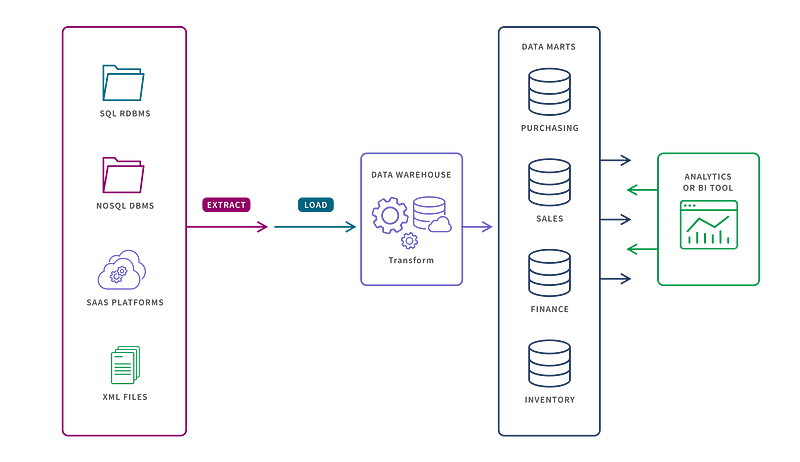Introduction to Data Marts
Data marts are a crucial component of modern data warehousing and business intelligence, providing users with a focused and optimized view of their data for more efficient analysis and decision-making. This comprehensive guide will explore the concepts, types, benefits, and implementation strategies of data marts, offering a deep understanding of how they can be effectively applied in various industries and use cases.
Data Mart: Core Concepts and Definitions
A data mart is a subset of a data warehouse that focuses on a specific business function or subject area, such as sales, finance, or marketing. Data marts are designed to provide users with fast and easy access to the data they need for their specific analytical and reporting requirements. To better understand the concept of data marts, it is essential to familiarize yourself with the following definitions:
Data Warehouse: A data warehouse is a central repository of integrated data from various sources, designed to support the efficient querying and analysis of large volumes of data. Data warehouses store historical and current data, enabling organizations to gain insights into their business performance over time.
Data Mart: A data mart is a smaller, more focused version of a data warehouse that contains a subset of the data relevant to a specific business function or subject area. Data marts enable users to access and analyze their data more quickly and easily, without the need to navigate the entire data warehouse.
Types of Data Marts
There are three main types of data marts, each with its unique characteristics and use cases:
Independent Data Mart: An independent data mart is a standalone data mart that is not directly connected to a data warehouse. Independent data marts are created by extracting, transforming, and loading (ETL) data from various source systems into the data mart, without relying on a central data warehouse for data integration. Independent data marts are suitable for small organizations or specific departments with limited data integration requirements.
Dependent Data Mart: A dependent data mart is a data mart that is directly connected to a data warehouse, from which it extracts the required data for its specific business function or subject area. Dependent data marts are created by extracting, transforming, and loading (ETL) data from the data warehouse into the data mart, ensuring a consistent and integrated view of the data across the organization. Dependent data marts are suitable for larger organizations with more complex data integration requirements.
Hybrid Data Mart: A hybrid data mart is a data mart that combines aspects of both independent and dependent data marts. Hybrid data marts can extract data from both the data warehouse and other source systems, offering a more flexible and adaptable solution for organizations with diverse data integration needs.
Benefits of Data Marts
Data marts offer several benefits in the context of data warehousing and business intelligence, including:
Focused Data Access: Data marts provide users with a focused view of their data, enabling them to access and analyze the data they need for their specific business function or subject area more quickly and easily.
Improved Query Performance: By containing only a subset of the data warehouse, data marts can improve query performance and enable faster data retrieval for reporting and analysis.
Data Security: Data marts can help enhance data security by providing users with access to only the data that is relevant to their specific business function or subject area, ensuring that sensitive information remains protected.
Ease of Maintenance: Data marts are smaller and more focused than data warehouses, making them easier to maintain and update over time.
Flexibility: Data marts can be tailored to the specific needs and requirements of different business functions or subject areas, providing a flexible solution that can be easily adapted to changing business needs and priorities.
Cost-Effectiveness: Data marts can be more cost-effective than implementing a full-scale data warehouse, especially for smaller organizations or specific departments with limited data integration requirements.
Implementing Data Marts: Strategies and Best Practices
When implementing data marts within your organization, consider the following strategies and best practices:
Define Business Requirements: Begin by identifying the specific business requirements and objectives of your data mart, ensuring that it aligns with the overall goals and strategies of your organization.
Select the Appropriate Data Mart Type: Determine whether an independent, dependent, or hybrid data mart is best suited to your organization’s data integration needs and capabilities.
Design the Data Mart Structure: Design the structure of your data mart, taking into consideration the specific business function or subject area it will support, as well as the desired level of data granularity and aggregation.
Implement the ETL Process: Develop and implement an ETL process for extracting, transforming, and loading data from your source systems or data warehouse into your data mart, ensuring that the data remains consistent and integrated across the organization.
Ensure Data Security and Compliance: Implement appropriate data security measures to protect the sensitive information stored in your data mart and ensure compliance with relevant data privacy regulations.
Test and Validate the Data Mart: Thoroughly test and validate your data mart to ensure that it meets the business requirements and supports the desired analytical capabilities.
Monitor and Update the Data Mart: Regularly monitor the performance of your data mart and update it as needed to accommodate changes in business requirements or data volume.
Conclusion
Data marts play a crucial role in modern data warehousing and business intelligence, providing users with a focused and optimized view of their data for more efficient analysis and decision-making. By understanding the core concepts, types, benefits, and implementation strategies of data marts, organizations can effectively apply this approach to their specific industries and use cases, ultimately driving better business outcomes. Implementing data marts within your organization requires careful planning and adherence to best practices, ensuring that your data mart solution remains aligned with your overall business goals and strategies, while providing the desired level of data access, performance, and security.

